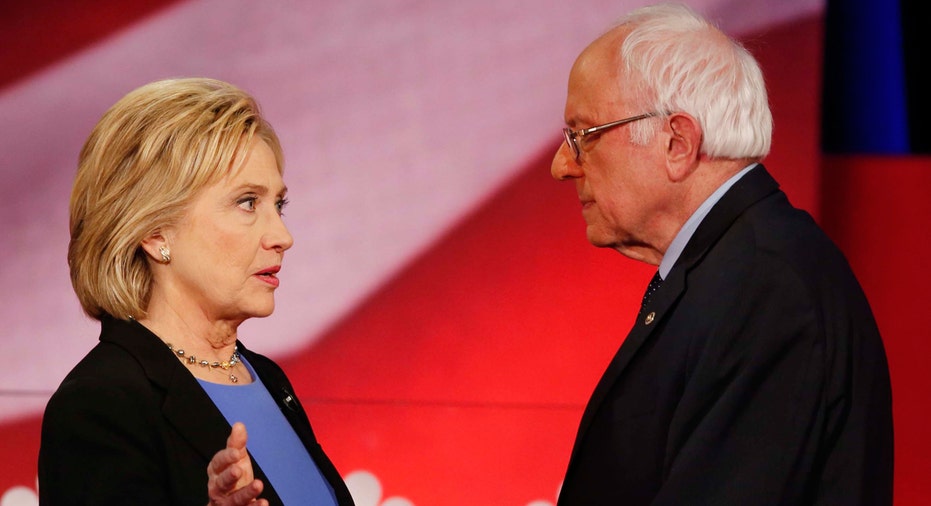Clinton, Sanders Vie for Upper Hand in Wall Street Reform

Democratic presidential hopefuls Hillary Clinton and Bernie Sanders both agree that more should be done to rein in the large financial institutions that exert so much influence over both the U.S. economy and the American political system.
But the two candidates, who will square off tonight in New Hampshire in the fifth debate between Democratic rivals, take very different approaches toward the measures they believe will help prevent another financial crisis.
The question is whether their proposals are even necessary in the wake of reforms already initiated by Congress – namely the massive Dodd-Frank banking reform legislation passed in 2010 – and, equally important, whether their plans have a snowballs chance of becoming law should either Clinton or Sanders win the general election in November.
The answer to the former is almost universally yes, that despite the sweeping nature of Dodd-Frank and its effectiveness in some areas in reducing risk taking by big banks, there’s still an inordinate amount of wealth and power concentrated among a handful of banks. The latter question – can either candidate push through their reforms – raises quite a bit of skepticism.
In any case, it’s an important subject.
“This matters for American families because a well-functioning financial sector allows families to buy houses, cars and to send their kids or themselves to college – and much more,” said Phillip Swagel, an economics professor at the University of Maryland.
Swagel said his concern is that the two candidates have reduced the complex topic of Wall Street reform to easily digestible sound bites.
“Post-crisis regulatory changes were needed, and parts of Dodd-Frank are useful -- more capital, more transparency for derivatives transactions, among others. A lot has been done, and it would be useful to figure out what is working and what is not – to assess the costs and benefits. This is an important policy area, and yet Secretary Clinton and Senator Sanders are treating financial regulation as an area for slogans,” said Swagel.
Specifically, Clinton has called for a “risk fee” on the largest banks, or those with more than $50 billion in assets, designed to discourage those banks from taking on too much debt and participating in the kinds of risky activities that contributed to the 2008 crisis. In addition, Clinton, unlike Sanders, would focus much of her attention on areas of the banking system that have stealthily gained influence in recent decades, the so-called “shadow banking sector” that includes dark pools, hedge funds and high frequency traders.
Sanders has said in no uncertain terms that as president he will focus his energies on breaking up the largest U.S. banks, the likes of Bank of America (NYSE:BAC), J.P. Morgan Chase (NYSE:JPM), Wells Fargo (NYSE:WFC) and Citigroup (NYSE:C). The Vermont senator’s stump speeches and campaign web site are rife with messages and statistics focusing on the extraordinary accumulation of wealth and economic sway held by the six largest U.S. banks.
Sanders, unlike Clinton, strongly supports reinstating the Glass-Steagall regulations that once outlawed banks from gambling with their clients’ money. Clinton (and many economists) doesn’t believe Glass-Steagall would have prevented the 2008 crisis and reinstating it, she says, would have little or no impact on the murky shadow banking sectors that have grown exponentially in influence in recent years.
Swagel said Clinton’s proposals offer clear examples of areas of the financial system that ostensibly need reform, but then stop short of explaining why those areas pose risks how her proposals would reform them. Clinton’s “rhetoric leans far left but her proposals are mainly symbolic and not impactful,” he said.
Sanders’ plans are also short on detail, Swagel said. “Senator Sanders would break up the big banks – he hasn’t quite said how, but that’s his aim.”
Dennis Kelleher, president and CEO of Better Markets, a Washington, D.C.,-based investor advocacy group formed in the wake of the 2008 crisis, said Congress already has the ability to break up so-called ‘too big to fail banks’ under Dodd-Frank. “There is massive authority under Dodd-Frank if anyone wanted to end too big to fail,” he said.
Kelleher said much of the Wall Street reform rhetoric emanating from all of the candidates’ campaigns – Democratic and Republican – hinges on a hypothetical future Congress amenable to passing new regulations to rein in the big banks. Given Wall Street’s sway over the political process, he said he’s skeptical that’s going to happen. Instead, the candidates should focus on reforming Wall Street under existing laws.
“Every candidate owes the American people a detailed explanation of how to regulate Wall Street under existing authorities,” he said. “It’s inexcusable that any ‘too big to fail’ banks remain.”
Clinton and Sanders are expected to sharpen their attacks on one another in tonight’s debate following Clinton’s narrow victory over Sanders in Monday’s Iowa caucuses. Clinton has suggested that Sanders, a self-described socialist, is making unrealistic promises he can’t keep as president. Sanders, who has mostly refrained from personal attacks, has OKd campaign ads criticizing the role Wall Street money plays in influencing political candidates, clearly a shot at Clinton’s close financial ties to Wall Street.



















